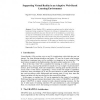Free Online Productivity Tools
i2Speak
i2Symbol
i2OCR
iTex2Img
iWeb2Print
iWeb2Shot
i2Type
iPdf2Split
iPdf2Merge
i2Bopomofo
i2Arabic
i2Style
i2Image
i2PDF
iLatex2Rtf
Sci2ools
120
click to vote
ECTEL
2009
Springer
2009
Springer
Supporting Virtual Reality in an Adaptive Web-Based Learning Environment
Virtual Reality (VR) is gaining in popularity and its added value for learning is being recognized. However, its richness in representation and manipulation possibilities may also become one of its weaknesses, as some learners may be overwhelmed and be easily lost in a virtual world. Therefore, being able to dynamically adapt the virtual world to the personal preferences, knowledge, skills and competences, learning goals and the personal or social context of the learning becomes important. In this paper, we describe how an adaptive Web-based learning environment can be extended from a technological point of view to support VR.
Related Content
| Added | 26 May 2010 |
| Updated | 26 May 2010 |
| Type | Conference |
| Year | 2009 |
| Where | ECTEL |
| Authors | Olga De Troyer, Frederic Kleinermann, Bram Pellens, Ahmed Ewais |
Comments (0)

